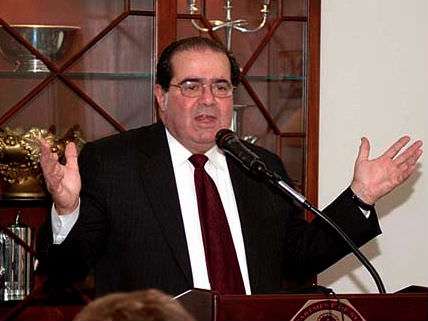How Scalia Helped Legalize Gay Marriage in Pennsylvania
In his decision this week striking down Pennsylvania's ban on gay marriage in Whitewood v. Wolf, U.S. District Judge John E. Jones III quoted extensively from the jurisprudence of Supreme Court Justice Anthony Kennedy. That came as no surprise, of course, since Kennedy has written all of the Court's biggest decisions in favor of gay rights, from Lawrence v. Texas (2003), which invalidated that state's ban on homosexual conduct, to United States v. Windsor (2013), which stuck down part of the 1996 Defense of Marriage Act.

But Judge Jones also relied on a more surprising ally to reach his conclusion. That ally was Justice Antonin Scalia, the same conservative jurist who once railed against his Supreme Court colleagues for "sign[ing] on to the so-called homosexual agenda." How did Scalia help Jones? It's relatively simple. When it came time for Jones to perform a crucial piece of legal analysis on the constitutionality of the Pennsylvania gay marriage ban, he found Scalia to be a more useful guide than Kennedy. That sealed the deal and allowed Jones to legalize same-sex unions in the Keystone State. Here's how these strange judicial bedfellows came together.
Last term in U.S. v. Windsor, the Supreme Court was tasked with deciding whether Section 3 of the Defense of Marriage Act (DOMA), which had forbidden the federal government from recognizing same-sex unions that were permitted under state law, violated the equal protection component of the Fifth Amendment. Kennedy's majority opinion held that it did.
In dissent, Scalia lambasted Kennedy for sidestepping the Court's precedents governing equal protection cases. "The opinion," Scalia wrote in Windsor, "does not resolve and indeed does not even mention what had been the central question in this litigation: whether, under the Equal Protection Clause, laws restricting marriage to a man and a woman are reviewed for more than mere rationality."
Scalia had a point. Typically, when the Equal Protection Clause of the 14th Amendment (or the equal protection component of the Fifth Amendment) is at issue, the courts first decide what degree of judicial review is appropriate for resolving the case. There are three basic settings. The most lenient is rational-basis review (Scalia's "mere rationality"), where the courts extend broad deference to the government. The next level is called intermediate scrutiny, or sometimes heightened scrutiny. Here the government must shoulder most of the burden of proof and demonstrate that its statute is substantially related to an important government objective. Finally, there is strict scrutiny, the most exacting standard, which requires the government to prove both that the law serves a compelling government interest and that it is the least restrictive means for achieving that interest.
That may sound like a bunch of lawyers splitting hairs; but the real-world impact cannot be overstated. Rational-basis review stacks the deck overwhelmingly in favor of the government. ("It is enough," the Supreme Court held in one rational-basis case, "that it might be thought that the particular legislative measure was a rational way" for lawmakers to proceed. Emphasis on might be thought.) Intermediate scrutiny, by contrast, reverses the odds and forces lawmakers to mount a persuasive and verifiable defense of their contested statutes. In practical terms, rational-basis review allows a gay marriage ban to remain in force; intermediate scrutiny requires the ban to fall.
Yet when Kennedy wrote his Windsor opinion invalidating part of DOMA, he did not clearly adopt any of one of those differing levels of review. Instead, he spent the bulk of the opinion emphasizing the fact that DOMA singled out one class of Americans for abuse. At the same time, however, he also included certain language taken from rational-basis cases. But as Scalia complained in dissent, "the Court certainly does not apply anything that resembles that deferential framework." In other words, Scalia accused Kennedy of quietly deploying intermediate scrutiny without bothering to justify why that heightened approach was appropriate under the Court's precedents.
Which brings us back to Judge Jones and his ruling this week in Pennsylvania. Like every other federal judge weighing a state ban on gay marriage, Jones was duty-bound to follow relevant Supreme Court jurisprudence. But as noted above, the most directly applicable case, Kennedy's ruling on DOMA, offers no clear guidance on the appropriate level of judicial review a lower court judge should apply. That put Jones in a legal pickle. Should he defer to the Pennsylvania ban or not?
To answer that question, Jones turned to Scalia. "As Justice Scalia cogently remarked in his dissent," Jones wrote, "'if [Windsor] is meant to be an equal-protection opinion, it is a confusing one.'" Then, lest anyone miss the point, Jones proceeded to adopt Scalia's reading of Windsor: "Its discussion is manifestly not representative of deferential review." As Scalia saw it, Windsor was an intermediate scrutiny case in all but name. Jones happily signed on to that interpretation and applied a fatal dose of heightened scrutiny to Pennsylvania's gay marriage ban.


Show Comments (14)